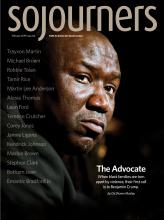SEVEN YEARS AGO this month, Trayvon Martin, an unarmed 17-year-old high school student, was shot and killed while visiting relatives in Sanford, Fla. After George Zimmerman’s 2013 acquittal for Trayvon’s murder, I wrote about what it meant to me, particularly as a father.
I wrote about the fundamental injustice of a system and a nation in which a teenage boy like Trayvon could be killed as a direct result of being racially profiled, and his killer not held accountable, while my own teenage boys would never need to fear that a stranger would target them due to their race:
If my white 14-year-old son, Luke, had walked out that same night, in that same neighborhood, just to get a snack, he would have come back unharmed—and he would still be with me and Joy today. But when black 17-year-old Trayvon Martin went out that night, just to get a snack, he ended up dead—and is no longer with his dad and mom. Try to imagine how that feels, as his parents.
Martin Luther King Jr. said in his “I Have a Dream” speech, “I have a dream that my four little children will one day live in a nation where they will not be judged by the color of their skin, but by the content of their character.” King’s dream failed on Feb. 26, 2012, when George Zimmerman decided to follow Trayvon Martin because of the color of his skin. Racial profiling is a sin in the eyes of God. It should also be a crime in the eyes of our society and in the laws we enact to protect each other and our common good.
Read the Full Article

